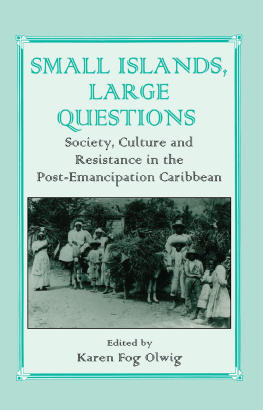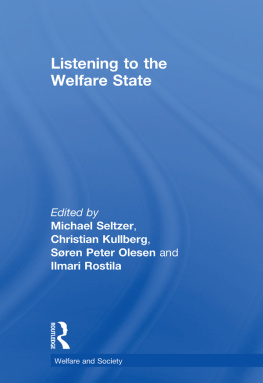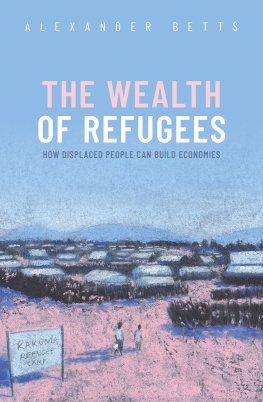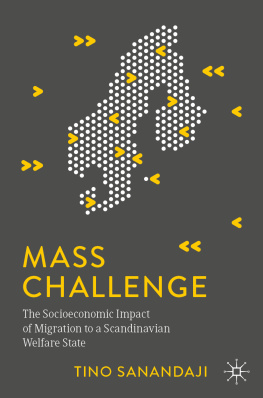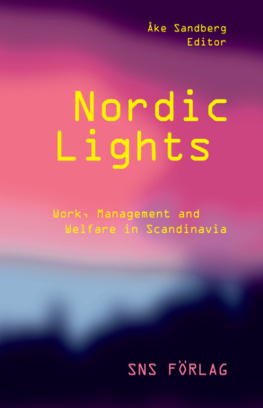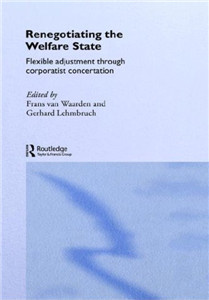
Migration, Family and the Welfare State
Migration, Family and the Welfare State explores understandings and practices of integration in the Scandinavian welfare societies of Denmark, Norway and Sweden through a comprehensive range of detailed ethnographic studies. Chapters examine discourses, policies and programs of integration in the three receiving societies, studying how these are experienced by migrant and refugee families as they seek to realize the hopes and ambitions for a better life that led them to leave their country of origin. The three Scandinavian countries have had parallel histories as welfare societies receiving increasing numbers of migrants and refugees after World War II, and yet they have reacted in dissimilar ways to the presence of foreigners, with Denmark developing tough immigration policies and nationalist integration requirements, Sweden asserting itself as a relatively open country with an official multicultural policy, and Norway taking a middle position. The book analyses the impact of these differences and similarities on immigrants, refugees and their descendants across three intersecting themes: integration as a welfare state project; integration as political discourse and practice; and integration as immigrants and refugees quest for improvement and belonging.
This book was originally published as a special issue of the Journal of Ethnic and Migration Studies.
Karen Fog Olwig is a Professor in the Department of Anthropology at the University of Copenhagen, Denmark. Her main research has examined the role of family relations in migration processes in the Caribbean, North America and Europe, working with narrative analysis of life stories.
Birgitte Romme Larsen is a post doc. at the Department of Anthropology, University of Copenhagen, Denmark. Her research focused on the role of the family and domestic routines in integration process involving refugee and immigrant families settled in rural Denmark.
Mikkel Rytter is an Assistant Professor in the Department of Anthropology at Aarhus University, Denmark. He has done extensive research on family and marriage among Pakistanis in Denmark. His current research is concerned with Sufism and transnational spirituality.
Migration, Family and the Welfare State
Integrating Migrants and Refugees in Scandinavia
Edited by
Karen Fog Olwig, Birgitte Romme Larsen and Mikkel Rytter
First published 2012
by Routledge
2 Park Square, Milton Park, Abingdon, Oxon, OX14 4RN
Simultaneously published in the USA and Canada
by Routledge
711 Third Avenue, New York, NY 10017
Routledge is an imprint of the Taylor & Francis Group, an informa business
2012 Taylor & Francis
This book is a reproduction of the Journal of Ethnic and Migration Studies, volume 37, issue 2. The Publisher requests to those authors who may be citing this book to state, also, the bibliographical details of the special issue on which the book was based.
All rights reserved. No part of this book may be reprinted or reproduced or utilised in any form or by any electronic, mechanical, or other means, now known or hereafter invented, including photocopying and recording, or in any information storage or retrieval system, without permission in writing from the publishers.
Trademark notice: Product or corporate names may be trademarks or registered trademarks, and are used only for identification and explanation without intent to infringe.
British Library Cataloguing in Publication Data
A catalogue record for this book is available from the British Library
ISBN13: 978-0-415-50759-2
Typeset in Times New Roman
by Taylor & Francis Books
Publishers Note
The publisher would like to make readers aware that the chapters in this book may be referred to as articles as they are identical to the articles published in the special issue. The publisher accepts responsibility for any inconsistencies that may have arisen in the course of preparing this volume for print.
Contents
Karen Fog Olwig
Mikkel Rytter
Lisa kesson
Kristine Juul
Garbi Schmidt
Marita Eastmond
Ada I. Engebrigtsen
Anne Sigfrid Grnseth
Birgitte Romme Larsen
Lisa kesson is Senior Lecturer in Social Anthropology at the University of Gothenburg, Sweden, and Researcher at the Nordic Africa Institute in Uppsala, Sweden.
Marita Eastmond is Professor of Social Anthropology at the University of Gothenburg, Sweden, and Professor at the Nordic School of Public Health in Gothenburg, Sweden.
Ada I. Engebrigtsen is Professor of Social Anthropology at the Norwegian Social Research Institute (NOVA), in Norway.
Anne Sigfrid Grnseth is Associate Professor of Social Anthropology at the University College of Lillehammer, Norway.
Kristine Juul is Associate Professor of Geography at the University of Roskilde, Denmark.
Birgitte Romme Larsen is a post doc. in the department of Anthropology at the University of Copenhagen, Denmark.
Karen Fog Olwig is a Professor in the Department of Anthropology at the University of Copenhagen, Denmark.
Mikkel Rytter is an Assistant Professor in the Department of Anthropology at Aarhus University, Denmark.
Garbi Schmidt is Professor at the Department of Culture and Identity, Roskilde University, Denmark.
Karen Fog Olwig
After a long history dominated by out-migration, Denmark, Norway and Sweden have, in the past 50 years, become immigration societies. This introduction compares how these Scandinavian welfare societies have sought to incorporate immigrants and refugees into their national communities. It suggests that, while the countries have adopted disparate policies and ideologies, differences in the actual treatment of and attitudes towards immigrants and refugees in everyday life are less clear, due to parallel integration programmes based on strong similarities in the welfare systems and in cultural notions of equality in the three societies. Finally, it shows that family relations play a central role in immigrants and refugees establishment of a new life in the receiving societies, even though the welfare society takes on many of the social and economic functions of the family.
Introduction
This volume examines understandings, practices and experiences of immigration and social incorporation in the three Scandinavian countries of Denmark, Norway and Sweden. It focuses, in particular, on the ways in which migrants and refugees seek to establish a meaningful life betwixt and between, on the one hand, expectations of proper integration, as expressed in public debate and implemented through various government initiatives and, on the other, the ambitions and desires for a better life for themselves and their families that have led them to opt for migration or flight to another country.
Denmark, Norway and Sweden provide an interesting and fruitful framework of comparison. They share a parallel history of migration, being dominated by out-migration until the 1960s and 1970s, when they experienced a great increase in unskilled foreign labour migrants needed in industry. After this brief period of relatively liberal immigration policy, the countries have increasingly instituted restrictions so that immigration has virtually only become possible through family reunification or the conferral of refugee status.1 Furthermore, Denmark, Norway and Sweden are all welfare states developed to a great extent by strong Social Democratic governments. They are based on the universalist Nordic model, where welfare services are provided through national agencies, closely integrated into the public sector and funded by general taxation (Andersen 1984). The right to the services of the welfare state is therefore based on citizenship or residency, not on previous employment, income or contribution to the welfare system. The Scandinavian welfare systems, particularly through their extensive social services and national health programmes, have thus assumed many of the responsibilities that, in other countries, are undertaken by the family, private organisations or businesses, albeit with the help of state support. The main exception is support to the unemployed, administered through the unions and based on individual contributions and state funding. Through these welfare programmes the Scandinavian states intervene directly in peoples private lives, and this is widely accepted by their populations, which have a generally positive attitude toward the state and public authorities (Jhncke 2011; see also Schmidt; Larsen this volume). The Nordic welfare model has therefore worked because the national populations have been willing to pay high income taxes in exchange for access to a range of welfare services.


